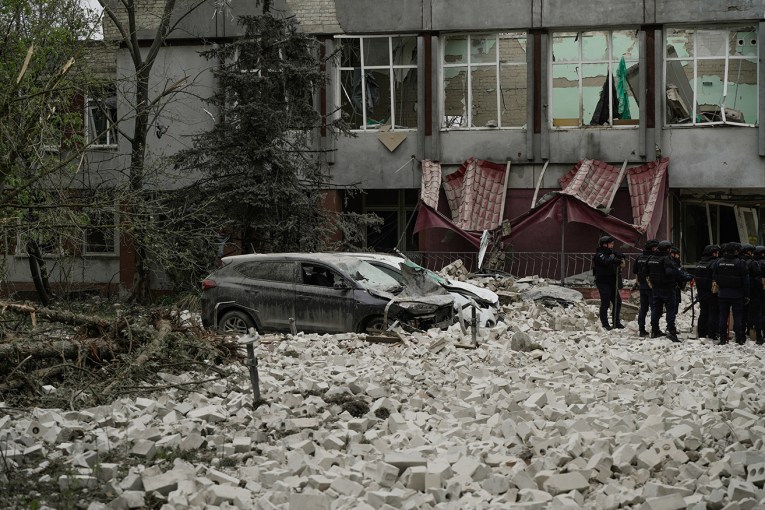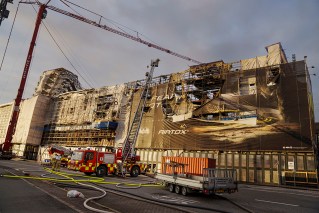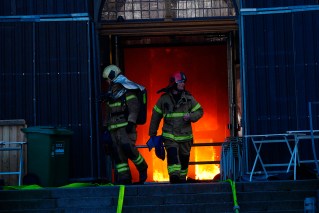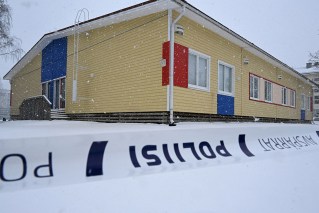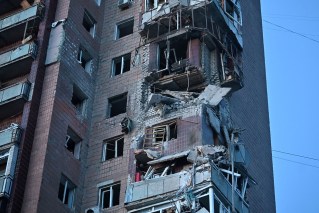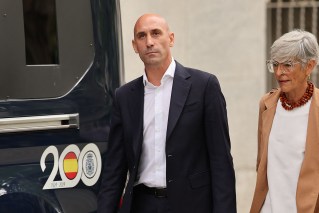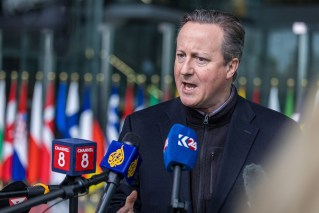‘Lightning fast’: Putin warns against outside intervention in Ukraine

Russian President Vladimir Putin has threatened any nations interfering in Ukraine with a “lightning-fast” response.
“We have all the tools for this – ones that no one can brag about. And we won’t brag. We will use them if needed. And I want everyone to know this,” Mr Putin said, in what has been seen as a chilling reference to ballistic missiles and nuclear arms.
Speaking to Russian lawmakers in St Petersburg on Wednesday (local time), Mr Putin vowed to achieve “all the goals” of the Russian “special operation” in Ukraine.
“If someone intends to intervene into the ongoing events [in Ukraine] from the outside and creates unacceptable strategic threats for us, then they should know that our response to those strikes will be swift, lightning fast,” he said.
Mr Putin’s latest fiery speech came as Ukraine’s allies stepped up the supply of weapons, with the US vowing to make sure its fighters defeat Russia.
There has been a recent jump in pledges of more military support for Ukraine, including Germany’s announcement that it will send 50 anti-aircraft tanks.
Mr Putin spoke a day after Western nations met in Germany, promising to ramp up military support for Ukraine. US Defence Secretary Lloyd Austin pledged to move “heaven and earth” to make sure Ukraine won the war.
Western officials say Russia is being hampered in its efforts in Ukraine’s east, after withdrawing from the areas around Kyiv.
Last week, Russia launched a major offensive to seize the Donbas region. But according to one official, Russian forces were “finding it difficult to overcome the staunch Ukrainian resistance and they are suffering losses”.
Russia has also reported a series of blasts in its south and a fire at an ammunition depot, the latest in a spate of incidents that a top Ukrainian official described as payback and “karma” for Moscow’s invasion.
Without directly admitting that Ukraine was responsible, presidential adviser Mykhailo Podolyak said it was natural that Russian regions where fuel and weapons were stored were learning about “demilitarisation”.
“If you (Russians) decide to massively attack another country, massively kill everyone there, massively crush peaceful people with tanks, and use warehouses in your regions to enable the killings, then sooner or later the debts will have to be repaid,” Mr Podolyak said.
The blasts on Wednesday followed a major fire this week at a Russian oil storage facility in the Bryansk region near the border.
Earlier this month, Russia accused Ukraine of attacking a fuel depot in Belgorod with helicopters, which a top Kyiv security official denied, and opening fire on several villages in the province.
The incidents have exposed Russian vulnerabilities in areas close to Ukraine that are vital to its military logistics chains.
Elswhere, the United Nations said its humanitarian office was mobilising a global team to co-ordinate the removal of civilians from the besieged steel plant in the battered Ukrainian city of Mariupol with the International Committee of the Red Cross.
UN Secretary-General Antonio Guterres and Mr Putin agreed in principle to UN and ICRC participation in the plant evacuation during a nearly two-hour, one-on-one meeting on Tuesday.
The sprawling Azovstal complex, which has been almost completely destroyed by Russian attacks, is the last pocket of organised Ukrainian resistance in Mariupol.
An estimated 2000 troops and 1000 civilians are said to be holed up in bunkers underneath the wrecked structure.
UN deputy spokesman Farhan Haq said on Wednesday that the UN was trying to translate the Guterres-Putin agreement in principle “into an agreement in detail and an agreement on the ground”.
“Ultimately what we want is to make sure that a ceasefire would be respected that would allow us to move people safely,” he said.
Mr Haq said UN officials would speak again with authorities in Russia and Ukraine on Wednesday “to develop the operational framework for the timely evacuation of civilians”.
He said the exact timing depended on the outcome of discussions between the UN humanitarian office and Russia’s Ministry of Defence in Moscow as well as between the UN crisis co-ordinator for Ukraine, Amin Awad, and the authorities in Kyiv, where Mr Guterres will meet Ukraine’s President Volodymyr Zelensky on Thursday.
Also on Thursday, human rights lawyer Amal Clooney urged countries at the UN to focus on international justice for war crimes in Ukraine so evidence did not sit in storage – as it has done for victims of Islamic State in Iraq and Syria.
“Ukraine is, today, a slaughterhouse. Right in the heart of Europe,” Ms Clooney told an informal UN Security Council meeting on accountability in Ukraine, organised by France and Albania.
Ms Clooney recalled a 2017 Security Council vote to approve a measure she helped lobby for – the creation of a UN team to collect, preserve and store evidence of possible international crimes committed by Islamic State in Iraq.
It was the same year her son and daughter with US actor George Clooney were born.
“My children are now almost five, and so far most of the evidence collected by the UN is in storage – because there is no international court to put ISIS on trial,” she said.
The International Criminal Court, which handles war crimes, crimes against humanity, genocide and crimes of aggression, has no jurisdiction because Iraq and Syria are not members.
Ms Clooney is part of an international legal task force advising Ukraine on securing accountability for Ukrainian victims in national jurisdictions and working with the Hague-based ICC.
-with AAP
